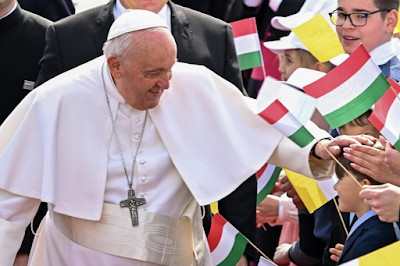Distraction, change of course or simply Papal delight in confusion?
Bergoglians irritated after the Pope's visit to Hungary
There is some irritation in the wider papal circle following Pope Francis' visit to Hungary. That is surprising. What is the background?
It is the combination that irritates Bergoglian circles and makes them somewhat doubtful about Pope Francis' current intentions. The starting point for the mistrust is the second papal visit to Hungary. Why did Francis return to the Danube bend after one and a half years? There has never been such a quick succession of two papal trips under Francis. There has been some speculation about this. The meeting with Eparch Hilarion, the former "foreign minister" of the Moscow Patriarchate and now Russian Orthodox bishop in Hungary, was also mentioned.
The Bergoglians, however, have other concerns.
With his second visit to Hungary, Francis broke through the isolation of Viktor Orbán and his national conservative government that is being practised in the West. While Brussels and Washington pursue the exclusion of Orbán and his Christian-based government programme, Francis did the exact opposite and visited Hungary twice within a short period of time. Some, concerned, want to see in this a demonstrative gesture.
But there is more to it than that. On 30 April, Francis returned to Rome from Hungary. Mainstream media tried to neutralise the visit with reports, which hardly succeeded. Francis' praise for Orbán's pro-family and pro-child policies and his rejection of the anti-life and anti-family leftist gender agenda was too clear.
Just a few days after Francis' departure, the largest conference of conservative, anti-globalist, non-left political forces in a long time took place in Budapest. The organiser of the "patriots' assembly" (Herbert Kickl, FPÖ) was CPAC Hungary. The conference was supported by the US CPAC Foundation (Conservative Political Action Conference) and the Hungarian Center for Fundamental Rights.
Viktor Orbán seeks to cushion his isolation through contacts with Donald Trump and sections in the US close to him, especially within the Republican Party. In 2021, Orbán gave a memorable speech at CPAC in the US, which was printed in full by the Swiss newspaper Weltwoche. More recently, Orbán declared his hope that Trump would return to the White House in 2024, expressing his disapproval of current US policy under Joe Biden. Literally, Orbán said:
"Come back, Mr. President, make America great again and bring us peace again."
The dismissive allusion to the Ukraine conflict and the Biden administration's pressure on European states, as well as the ideological co-operation of Washington and Brussels for a left-wing green-woke agenda, was obvious.
Austria's opposition leader Herbert Kickl (FPÖ) visited Orbán last March to send a signal of solidarity, but also to seek co-operation on migration, the direction of the EU, price increases, family support and peace. After the Corona, climate, energy, inflation and Ukraine crises, the FPÖ is now the lonely leader of all election polls with a constant 30 percent. And the trend is upwards. That is single-handedly more than the current Austrian federal government of the ÖVP and the Greens put together.
A few days before Pope Francis reached Budapest, Viktor Orbán told Radio Kossuth:
"What is happening at the moment is destroying Europe. It is destroying its security, it is destroying its economy (...)."
Newly clearer, he indicated that the conflict in Ukraine will end as soon as the US and the EU stop funding it.
Earlier in March, he also said:
"The countries of the European Union must create their own defence alliance without the US pursuing personal interests in dealing with international security issues."
At the same time, he expressed the fear that "step by step, the whole of Europe is heading for war".
This close temporal context irritates in the Papal environment. Orbán is known for his patriotic, conservative pro-family and pro-children policies. He fights the bought influence of western oligarchs like George Soros and their leftist social policies. It stands for national sovereignty and against disenfranchisement by international democratically non-legitimised institutions, corporations or oligarch foundations.
Speakers at the CPAC conference from the German-speaking world included Herbert Kickl and Harald Vilimsky (both FPÖ), Roger Köppel (SVP) and Hans-Georg Maaßen, the former president of the Federal Office for the Protection of the Constitution and current chairman of the Werteunion, an unrecognised apron organisation of the CDU and CSU.
Why did Pope Francis seek out Orbán, of all people, now, so shortly before the CPAC conference? Indeed, the timing is surprising, since Francis, the "politician on the papal throne" weighs his steps very carefully and demonstratively avoids receiving right-wing politicians even in audience.
Is it all just coincidence, the very coincidence that Francis, the "Pope of gestures" consciously tries to exclude? No answer can be given to the question at present. This is precisely what unsettles the Bergoglian public, far more than conservative church circles sceptically marvel at.
It has already been Francis' latent goal so far not to let himself be completely "captured" even by his own supporters. It is obviously in keeping with his character to always be one step ahead of any appropriation through unrest and confusion. At least he seems to have succeeded in this with the visit to Hungary.










.jpeg)

Comments